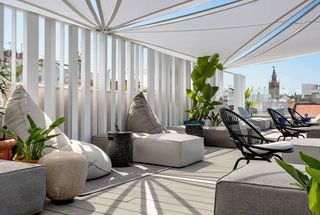Constructing a Green and Sustainable Future

This week is World Green Building Week. Organized by the World Green Building Council (WorldGBC) and led by a global network of 70 Green Building Councils, World Green Building Week seeks to promote sustainable construction for an inclusive and resilient net zero built environment. They do this by accelerating the use of healthy, sustainable construction materials and the efficient use of energy, water, and other resources, thereby improving human health, and providing solutions to address climate change for everyone, everywhere.
The world’s buildings have a huge impact on the global environment, both in terms of their construction, which uses 50% of all extracted materials, and in their operation, which generates 38% of all energy-related carbon emissions. The World Green Building Council aims at making access to adequate and sustainable housing, workplaces, and commercial buildings universal.
In today’s climate following the COVID-19 pandemic, we are seeing a strong demand, both from investors and consumers for green with a health and wellbeing framework to ensure that sustainability is at the forefront at every level, from the design and construction of new hotels, including the health of construction workers, to the comfort of those who work in and occupy the buildings, to the impact of the buildings on our environment.
Increasingly Green Buildings are the norm and can generate a premium on the asset value. And increasingly real estate lenders are paying much closer attention to sustainability in all stages of a building’s life cycle. According to a report from JLL, demand for green-linked financing is growing, and real estate lenders are increasingly offering loans based on sustainability performance. Last year, over $700 billion of sustainable and green debt was issued globally, and according to Bloomberg, could mean that investments tailored for environmental, social, and governance factors could grow to more than $53 trillion of assets by 2025 [1].
Besides the impact of construction itself, we need to consider its wider impact on the health and wellbeing of occupants and surrounding communities. The WorldGBC has outlined a clear health and wellbeing framework with six principles for a healthy and sustainably built environment which we encourage asset owners and operators to endorse. This includes taking climate action, creating positive social value with buildings and communities, protecting and improving health, prioritizing comfort for building users, and designing for harmony between natural and built environments.
The recent opening of Radisson Resort & Spa Lonavala in India is a prime example of how sustainability is integral to our day-to-day operations, and how we, like the WorldGBC, aspire to be a catalyst for change in the “green building” movement. The resort has invested in solar energy, the recycling of waste products, water harvesting, and using native vegetation in its landscaping to ensure that nature is at the heart of the resort’s design and architecture, where natural elements are celebrated not only for being aesthetically pleasing but also for being environmentally and economically viable. The resort’s entrance lobby echoes the design of Shivaji’s forts and embraces the “green building” ethos that aims to reduce or eliminate negative impact by its construction or operation and to create positive impacts on our climate and natural environment, by preserving precious natural resources and improving everyone’s quality of life.
The famed architects, Borgos Pieper, recently completed another groundbreaking “green building” sustainable project for Radisson Hotel Group with the transformation of two historic buildings in the Plaza de la Magdalena in Seville, which together define the western edge of the square, including the new Radisson Collection Hotel, Magdalena Plaza Sevilla. The transformed five-star hotel runs entirely on renewable energy, consumes 40% less water than the reference building, and has achieved Spain’s first LEED (Leadership in Energy and Environmental Design) Hospitality Gold certification for creating a walkable project site, which consists of incorporating design elements that promote walking, cycling, and other non-motorized transportation in the hotel location and its surrounding community.
As members of the Sustainable Hospitality Alliance, major hotel groups, among them Radisson Hotel Group, embrace and help drive wider climate action, water stewardship and responsible consumption, and the development of youth employment and human rights projects globally. In the run-up to the COP26 UN Climate summit, the moment is now for the hotel industry to collectively state our ambition for a roadmap to Net Zero including an accessible starting point of common Global Hotel Sustainability Basics, for operations and hotel real estate.
[1] https://thpt.co.uk/how-real-estate-is-starting-to-embrace-green-finance/?utm_source=rss&utm_medium=rss&utm_campaign=how-real-estate-is-starting-to-embrace-green-finance